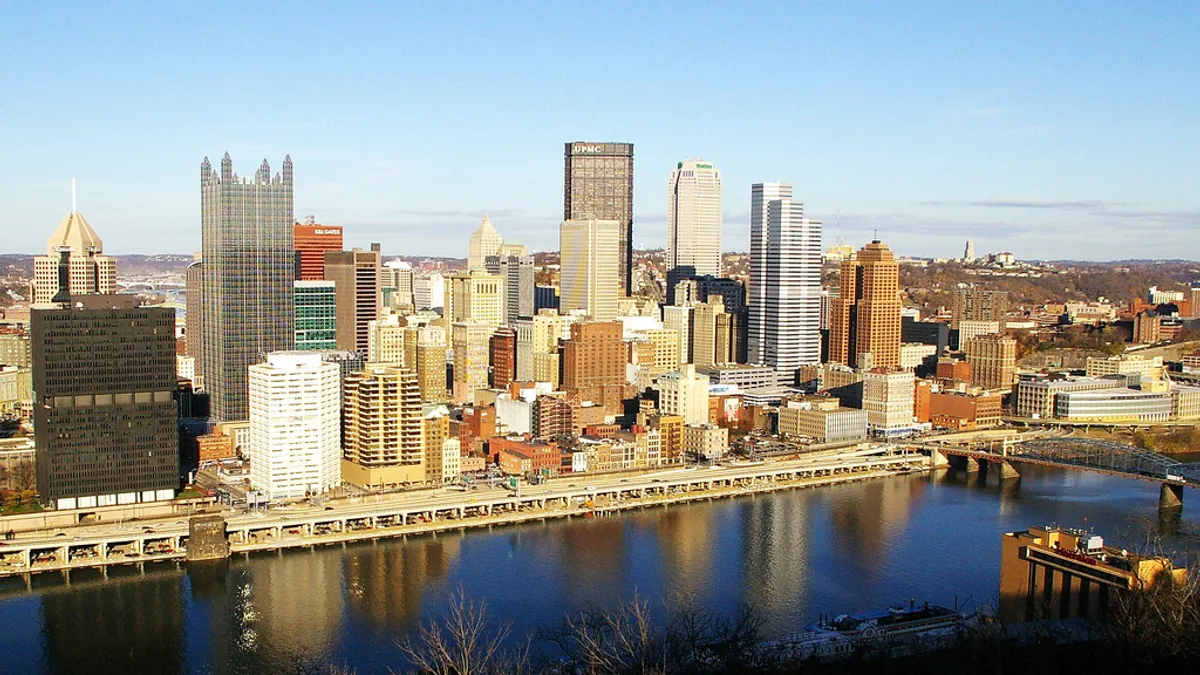Dive Brief:
- The United Nations Economic Council on Europe (UNECE) and the Green Building Alliance (GBA) signed an agreement to establish Pittsburgh's International Center of Excellence on High Performance Buildings.
- The center's core goal is to reduce the effects of climate change by making improvements to the built environment through UNECE's Framework Guidelines for Energy Efficiency Standards in Buildings. It will work with global sustainability experts to identify and employ best practices for sustainable building design, construction and policy that creates healthy, equitable and resilient communities. Partners include the City of Pittsburgh, Allegheny County, PA, developers and business leaders.
- Pittsburgh is the second city in the world to participate in the program, following New York's Building Energy Exchange.
Dive Insight:
The center will work toward tangible solutions based on the UN's sustainable development goals. It will conduct programs to train architects, engineers, planners and contractors on sustainable design and construction; gather public and private sector leaders to discuss challenges to high-performance building; provide technical and innovation assistance; and advocate for changes in local and state policies such as building codes, zoning incentives and energy regulations.
This UN initiative focuses on the built environment because buildings use more than 70% of the electrical power generated and are responsible for about 40% of global greenhouse gas emissions. Many U.S. cities are implementing policies and programs to improve building energy efficiency and reduce emissions.
This summer, Chicago launched its Energy Rating System that rates large buildings' energy efficiency and requires the scores to be posted publicly on placards. Earlier this year it committed to using 100% renewable energy by 2035. More than 100 other U.S. communities have committed to transitioning to clean energy.
Pittsburgh Mayor Bill Peduto introduced legislation earlier this month requiring that government buildings are net-zero energy efficient. That occurred just weeks after the city released its first energy benchmarking report for city owned and operated buildings.
The new center will build on the Pittsburgh 2030 District, which commits landmark properties to 50% reductions in energy use, water consumption and transportation emissions by 2030. Pittsburgh is the world's largest 2030 District.
"The International Centres transform how we build cities, from the materials we use, to building design and construction, to the policies that set new standards for the future," GBA Executive Director Jenna Cramer said in a statement. "We have the unparalleled opportunity to champion cutting-edge innovation while transitioning our workforce to create a healthier future."
Aside from reducing emissions and boosting energy efficiency, a core tenet of UNECE's sustainable energy work is to ensure all people have access to clean, affordable energy. Renewable energy is often viewed as a luxury that only wealthy citizens can afford, while fossil fuels are cheaper. This disparity is especially evident in vehicle ownership because well-heeled citizens thus far are the predominant demographic that owns electric vehicles (EVs).
Residential solar panels are another example where renewable energy is considered a luxury, as low-income citizens are often left out of installing and receiving the benefits of renewable energy.
Local and state governments and regulators increasingly are providing assistance to low-income citizens who want to transition to renewable energy. The California Public Utilities Commission has a $1 billion program to offer rebates for installing solar power on multifamily affordable housing buildings. And part of the affordable housing plan released in Atlanta this summer includes expanding energy efficiency programs.
Further ideas to assist low-income citizens with achieving energy efficiency and reducing their emissions could come out of Pittsburgh's center of excellence.












